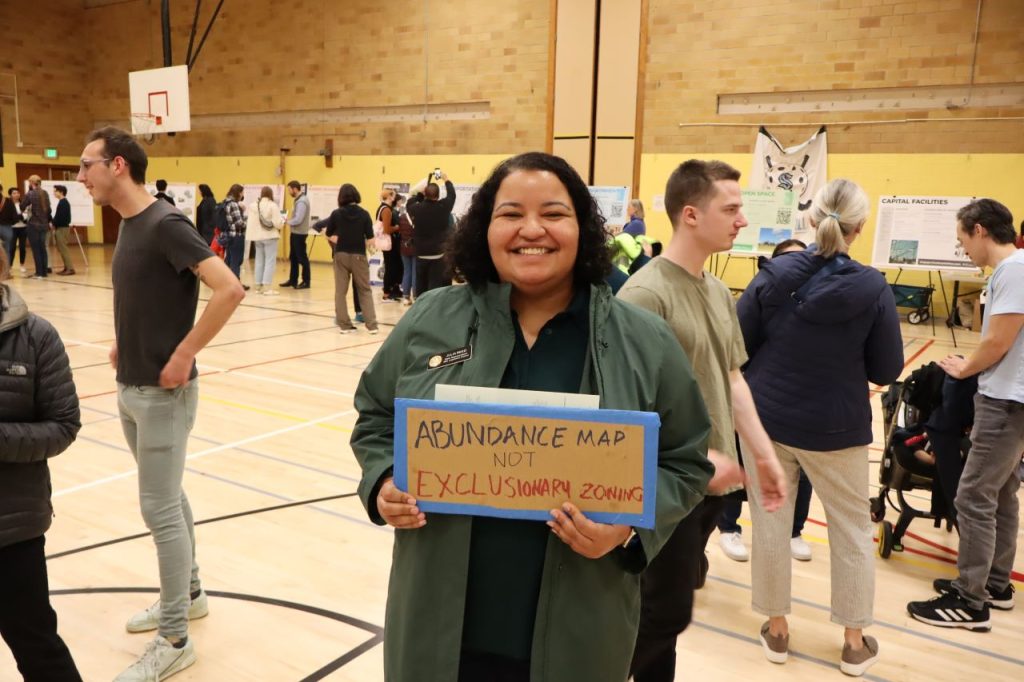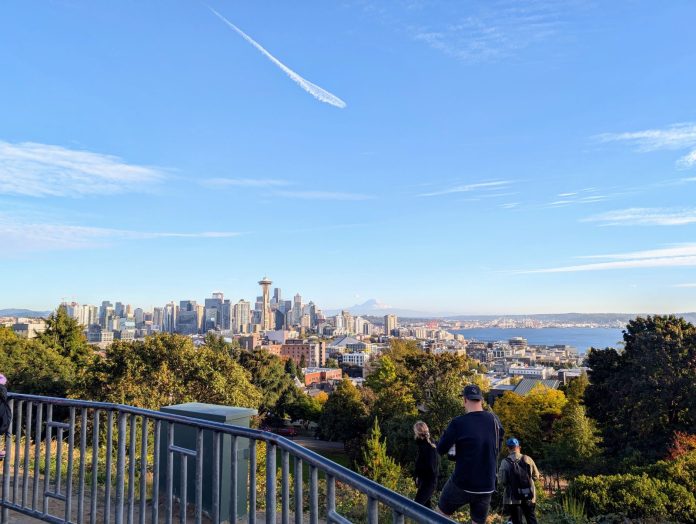
A ton is on the ballot this November and the results will have massive repercussions for the future of Washington state. And that’s before even getting to the candidates. Republicans are seeking to repeal some of the biggest legislative victories of the last decade.
That full-court ballot campaign onslaught is brought to you by a megamillionaire hedge fund manager named Brian Heywood who moved here from California. Heywood bankrolled the signature-gathering campaign, and he wants to give himself and his super-rich friends a massive tax cut at the expense of hard-working Washington families. Let’s not be duped into thinking this is altruistic. The Urbanist’s general election endorsements are here to help weed through this mess.
We must defend the Climate Commitment Act and capital gains tax funding for public education from this repeal effort. There are four Republican-backed statewide initiatives crowding your ballot, and the short answer is you should vote no on all four. For longer answers, read on in the initiative writeups below for full rundown.
With Trump on the top of the ballot, going backwards is a theme for Republicans this cycle, and one voters must reject. It’s time to move forward and reach for a brighter future. Investing in education, transit, safe streets, clean energy, green jobs, and care infrastructure is how we build that brighter future. The Republican initiatives and the Republican on the top of the ticket are not on the same page.
This election isn’t all about playing defense, however. As we wrote in our primary endorsements, we’re excited that many of the candidates appear poised to move us forward and tackle big issues, as well.
Ryan Mello’s campaign could install a progressive urbanist in the Pierce County Executive seat for perhaps the first time ever. He’s a transit advocate and someone doggedly working for real solutions on tough issues like homelessness and public safety during his time on the Pierce County Council.
Alexis Mercedes Rinck dominated in the primary, giving progressives hope of narrowing the centrist majority on Seattle City Council and eventually retaking the body. Rinck’s experience forging coalitions and crafting homelessness policy would be a welcome addition to a council that seems increasingly focused on politics and the short-term rather than passing policies built to last.
Shaun Scott grabbing the torch from Frank Chopp is another race that should have progressives excited. The 43rd Legislative District has long been a progressive stronghold and only one candidate fits the bill. Scott has a proven record fighting poverty and advocating for the working class. Andrea Suarez, meanwhile, is a Republican masquerading as a Democrat.
Voters in the Olympia area also have a chance to send Rep. Jessica Bateman, an urbanist who is a rising star lawmaker, to the Washington State Senate. In the higher chamber, she will smooth the way for more big housing policy wins, as she did in the state house. The pro-housing coalition has unfinished business, and Bateman is a proven leader in getting major legislation over the finish line.
Return ballots to drop boxes or get them postmarked by 8pm November 5th to ensure your vote is counted. Register to vote or update your address here.
The Urbanist’s 2024 General Slate Cheat Sheet
| Initiative 2066: No | Initiative 2117: No |
| Initiative 2109: No | Initiative 2124: No |
| Governor: No Endorsement | Seattle Proposition No. 1: Yes |
| Attorney General: Nick Brown | Seattle City Council 8: Alexis Mercedes Rinck |
| Lands Commissioner: Dave Upthegrove | LD01-1: Davina Duerr |
| 1st Congressional District: Susan DelBene | LD05-1: Victoria Hunt |
| 2nd Congressional District: No Endorsement | LD22 Senate: Jessica Bateman |
| 8th Congressional District: No Endorsement | LD34-1: Emily Alvarado |
| 9th Congressional District: No Endorsement | LD34-2: Joe Fitzgibbon |
| Pierce County Executive: Ryan Mello | LD36-1: Julia Reed |
| Pierce County Council D2: Davida Haygood | LD36-2: Liz Berry |
| Pierce County Council D3: John Linboe | LD37-2: Chipalo Street |
| Pierce County Council D6: Jani Hitchen | LD38-1: Julio Cortes |
| LD-27-2: Devin Rydel Kelly | LD41-2: My-Linh Thai |
| LD27 Senate: Yasmin Trudeau | LD43-1: Nicole Macri |
| LD28 Senate: T’wina Nobles | LD43-2: Shaun Scott |
| LD29, Position 1: No Endorsement | LD45-2: Melissa Demyan |
| LD29-2: Sharlett Mena | LD46-2: Darya Farivar |
| LD33-2: Mia Su-Ling Gregerson |
No on Initiative 2117
All you need to know for the statewide initiatives is that none of them are good. All of them would defund critical programs or kneecap us from making critical policy changes for our climate, in a time where hurricanes are hitting the South in a double whammy.
Starting off with the easiest no, I-2117 would defund the Climate Commitment Act and all the critical funding that comes with it. The Climate Commitment Act is not a tax on you and me, it’s a cap and invest program that limits the amount of carbon that big polluters can emit, charges them for it, and uses those funds to invest in key programs including infrastructure, transit, improving air quality in overburdened communities and so much more.
Things that we love that would be eliminated if 2117 passes: youth ride free programs, fare free transit in Jefferson County, funding for safe routes to school, e-bike lending libraries and rebate programs, bicycle safety programs, and so much more. Passing 2117 would shift costs from corporations to communities to prevent wildfires, protect fish habitat, and fund roads and bridges. Vote no.
No on Initiative 2066
Like the other initiatives on the ballot this year, I-2066 is a billionaire-funded attempt to repeal legislative actions intended to move Washington forward. In particular, I-2066 reverses requirements in Washington’s energy code that work toward emissions-free construction, and could affect Washington’s ability to incentivize the construction of energy-efficient homes, set emissions standards, and require utilities to consider alternatives to gas. It could also endanger programs that help low-income families save money on energy through conservation and efficiency programs. I-2066 is opposed by a broad coalition, including labor unions, environmentalists, municipalities, elected officials, and us. Vote no on I-2066.
No on Initiative 2109
I-2109 would repeal Washington’s capital gains tax and force a massive financial crisis on public schools across the state. We strongly oppose this measure.
One of The Urbanist’s core policy principles is a just economy. Governments must enact bold policies to create healthy, happy, safe, and thriving communities that serve everyone — not only the mega-rich. Enacting a capital gains tax to fund our state’s struggling public education system was one crucial step forward in that effort. Now a handful of billionaires and aspiring billionaires want to repeal it. Only the 4,000 richest Washingtonians would pay this tax. The super-wealthy are the only ones who stand to benefit, while the negative consequences would be deep and widely shared.
It took years of hard work to pass the capital gains excise tax on stock market profits greater than $250,000. Doing so finally moved Washington out of the shameful distinction of being ranked as the state with the least equitable tax structure in the country — though only up one spot to the second worst, showing more work remains. We should be going forward on easing the share of the tax burden that falls on the working class, not backward. I-2109 would reverse that progress and eliminate more than $2.2 billion in funding for early learning, child care, K-12 education, and school construction over the next five years. Vote No.
No on Initiative 2124
Everyone deserves the required care they need as they grow older. Our current WA Cares program allows for an individual to access needed funds for long-term care through earnings provided via a required payroll tax. This tax, a sliver of a typical paycheck, adds up over the course of a lifetime, allowing workers to earn needed funding for age-related health needs. This includes doctors’ appointments, nursing or group home facilities, and more. Initiative 2124 aims to jeopardize this benefit.
I-2124 would allow workers to opt out of this tax as opposed to being automatically enrolled. While the veil of choice may seem like a good idea, I-2124’s implementation would deplete resources in the WA Cares Program. A no vote puts the Cares Program in jeopardy, potentially cutting access to those who need care. Voting NO on I-2124 is the only way to guarantee the Cares Program stays afloat and allows for more people in our state to get the care they need.
Yes on Seattle Proposition 1
Seattle has made an immense amount of progress when it comes to transportation infrastructure since voters approved the $930 million Levy to Move Seattle in 2015. That levy has kept the city’s transportation investments consistent through three elected Mayors and brought nearly 100 miles of new bike infrastructure, over 250 blocks of new sidewalks, three RapidRide lines, and countless pedestrian safety upgrades to the city’s streets.
But there’s still work to be done, with many of the city’s most dangerous roads left unchanged, large holes in the all-ages bike network, and missing sidewalks on nearly a quarter of the city’s streets.
The $1.55 billion transportation levy in front of Seattle voters this year in the form of Proposition 1 represents a continuation of many of Move Seattle’s programs. It includes a heavy focus on repaving the city’s deteriorating roadways – with a focus on heavy transit streets, keeping bridges in good repair and a commitment to double the pace of sidewalk construction. These investments are critical, and without any transportation levy at all, the amount of funding available for new pedestrian and bike infrastructure in Seattle will plummet.
If you’re a Seattleite who doesn’t think Prop 1 goes far enough in making investments in bike infrastructure, transit upgrades, or people-focused streets…so are we. The $151 million for transit investments, $133 million for bike safety and $193 million for pedestrian investments included in this levy represent a down payment on Seattle’s transportation system. We know the investments that Seattle needs to tackle to prepare for its future lay beyond the scope included in the package. However, the failure of Prop 1 would not, in our view, lead the city toward a larger package or a seismic shift in priorities, but would mean hitting the brakes on a lot of worthy projects, and risk a generational setback if City leaders opt to go smaller with a replacement.
So far, the biggest opposition to Prop 1 has come from former Councilmember Alex Pedersen, who opposed the Levy to Move Seattle and spent four years on Council trying to water down safe streets investments. Prop 1 is supported by everyone from the Seattle Metropolitan Chamber of Commerce to the Port of Seattle to Seattle Neighborhood Greenways and the Transit Riders Union. That’s a big tent of Seattleites who recognize that we can’t afford to go backward on transportation investments.
Vote yes on Prop 1 to Keep Seattle Moving.
Governor: No endorsement
Attorney General Bob Ferguson, the frontrunner Democrat running for Governor, declined to participate in our endorsement process, both during the primary and general. We would have loved to talk to him, because we have concerns about his record on transit and urbanism, and perhaps he could put them to bed. See our primary writeup for more on those reservations.
Clearly, we’re not going to tell you to vote for Republican Dave Reichert, who also skipped our process and hardly has had a pro-transit record himself. Reichert’s personal narrative leans heavily on “catching” the Green River Killer, an investigation that other cops on the taskforce say he bungled and lied about later. Gary Ridgeway eluded police for two decades, becoming the second most prolific serial killer in United States history with 49 confirmed murders before investigators finally cracked the case and arrested him in 2001. Around this time, Reichert launched a seven-term career in the U.S. Congress.
Reichert would clearly take the state backwards on climate, education, and health care access. He supports the ballot measures seeking to repeal the Climate Commitment Act, upending transportation funding in the state and letting major polluters off the hook, and the capital gains tax, which would blow an even larger hole in already struggling school budgets in the name of giving the wealthiest Washingtonians a tax break. Despite his other faults, Ferguson at least has pledged to stand by the Climate Commitment Act and school funding via the capital gains tax.
Attorney General: Nick Brown
The Urbanist Elections Committee endorsed Nick Brown for Attorney General in the primary election, and we proudly stand by that decision for the general. Now, Brown faces Republican Pete Serrano, the current mayor of Pasco.
Serrano is deeply conservative and does not reflect our values. He recently led someone on a fearmongering tour of transit that had deeply racist overtones — not to mention the vibe of someone who doesn’t actually ride transit regularly. We want leaders who support and understand the value of transit rather than use it as a campaign prop.
Brown has served as U.S. Attorney for the Western District of Washington, as general counsel to Governor Jay Inslee, and as a JAG officer. His breadth of experience, spanning beyond prosecution to civil litigation, is why we gave Brown the edge in the primary. Brown supports imports efforts to make our communities safer and more prosperous, such as tackling wage theft and gun violence. We appreciated Brown’s plan to consolidate the workers’ rights work at the office into a Labor & Worker Rights Division.
Vote Nick Brown.
Lands Commissioner: Dave Upthegrove
The open lands commissioner seat drew a surprisingly broad field this year, with some big names, from Democratic King County Councilmember Dave Upthegrove of Des Moines to Republican former US Representative Jaime Herrera Beutler of Clark County. Democrats narrowly avoided catastrophe in the primary. Both Republican candidates nearly advanced as the five Democratic candidates split the vote. Luckily, Upthegrove survived the primary by just a few dozen votes and will face off with Herrara Beutler.
In the primary, we endorsed Patrick DePoe, who is former vice chair of the Makah Tribe and the state Department of Natural Resources’ tribal relations director. Among remaining candidates, Upthegrove clearly rises to the top. Upthegrove has an impressive array of endorsements, including several major environmental groups. He clearly set the priority of preserving the state’s legacy forests, unlike his Republican opponent, who has pledged to ramp up logging.
Land commissioner is an important position. At nearly 6 million acres, state-owned lands account for about 13% of all land in Washington. Those state holdings include extensive forests and watersheds supporting threatened salmon runs. Commissioners must lead the state’s response to wildfires, which imperil our forests and threaten to choke our skies with smoke every summer. They also face opportunities to nurture the state’s sustainable timber industry and advance mass timber building technology that could allow us to construct greener, cleaner cities.
We trust Upthegrove to grow the next generation of old growth forests while seizing new opportunities to better manage forest lands, reducing wildfire risk and harvesting sustainable timber to feed a green building boom. That’s a lot more than we can say about Herrera Beutler.
Vote Upthegrove.
1st Congressional District: Suzan DelBene
With 63% of the primary vote, Suzan DelBene looks to be heading to another term in congress. DelBene responded to our questionnaire with clear priorities for another term including the child tax credit, high-speed rail, and affordable housing. We’re excited about her support for Supreme Court reform and her record as a staunch proponent of abortion access. We wish her platform included a broader array of data-driven policy proposals for improving public safety rather than leaning so hard on hiring more cops as the solution for every problem.
Her opponent, Jeb Brewer, has previously run unsuccessful races for state house and senate and currently works as a project manager. His blandly anti-tax and anti-regulation platform won’t enable the kind of infrastructure improvements or climate solutions even he admits are needed. DelBene is the clear choice for the first district.
2nd Congressional District: No Endorsement
The 2nd Congressional District needs a serious progressive challenger to long-time incumbent Rick Larsen, who has been a comfortable centrist. Larsen declined to participate in The Urbanist endorsement process. Unfortunately, none of the progressive challengers appeared serious during our primary process, leaving us without a home or primary endorsement.
MAGA Republican Cody Hart advanced with nearly 20% of the primary vote to Larsen’s 48%. Meanwhile, three Democratic challengers and a Green Party candidate split 16% of the primary vote. It’s too bad a more serious progressive challenger did not emerge. For now, a centrist Democrat is far better than a MAGA Republican goon.
8th Congressional District: No Endorsement
In the primary election, The Urbanist Elections Committee endorsed Imraan Siddiqi, who launched a progressive challenge against incumbent Democrat Kim Schrier and turned in strong questionnaire responses. Siddiqi didn’t make it through the primary. Instead, Republican banker Carmen Goers claimed second place to face Schrier in the general election. We have opted against endorsing in this race in November, as neither Schrier nor Goers returned a questionnaire or participated in our process.
Goers is a MAGA Republican, which would be a tough sell for us. She appears focused on the usual: blocking taxes on the rich and obstructing climate investments and green infrastructure.
While Schrier has been a good vote on abortion rights and gun control, we have reservations due to her support of Israel’s ongoing war on Palestine and her hardline stances on immigration and policing. She voted to censure Rashid Tlaib, the only Palestinian American in Congress, and keeps supporting sending more weapons to Israel — plus the recent deployment of U.S. troops to Israel. While The Urbanist focuses primarily on domestic issues, we will note that Palestinian-Americans are members of our community and they deserve a representative who cares about them. Without a chance to hear from Schrier and put these concerns to bed, we have declined to endorse in this race.
9th Congressional District: No Endorsement
Nonprofit worker Melissa Chaudhry is challenging Adam Smith from the left. Smith is a 28-year incumbent and Ranking Member of the House Armed Services Committee. As a social justice activist and a Muslim, Chaudhry is more firmly opposed to the genocidal war in Gaza than Smith, who says one thing and does another by backing more weapons and military support to Israel. While Chaudhry had long and thorough answers to our questionnaire, we were less impressed by our interview. Smith, for his faults, has been a consistent voice for housing abundance and zoning reform, an advocate for transit funding, and he helped nudge Biden into stepping aside for a stronger candidate. We appreciated his willingness to participate in our endorsement process, which shows he’s not coasting even after 14 terms. We liked aspects of both candidates, but found no ideal fit. Ultimately, we decided against endorsing in this race.
Seattle City Council Seat 8: Alexis Mercedes Rinck
Quick review of what’s happening here. The citywide Position 8 seat is currently held by Councilmember Tanya Woo, who lost her 2023 election to unseat Councilmember Tammy Morales, a champion for progressive revenue, social housing, and safe streets, and was instead appointed by the newly majority-centrist city council to fill an open seat. Woo, propelled onto the council by big corporate spenders, did not participate in our endorsement process this year and has a lackluster record to defend.
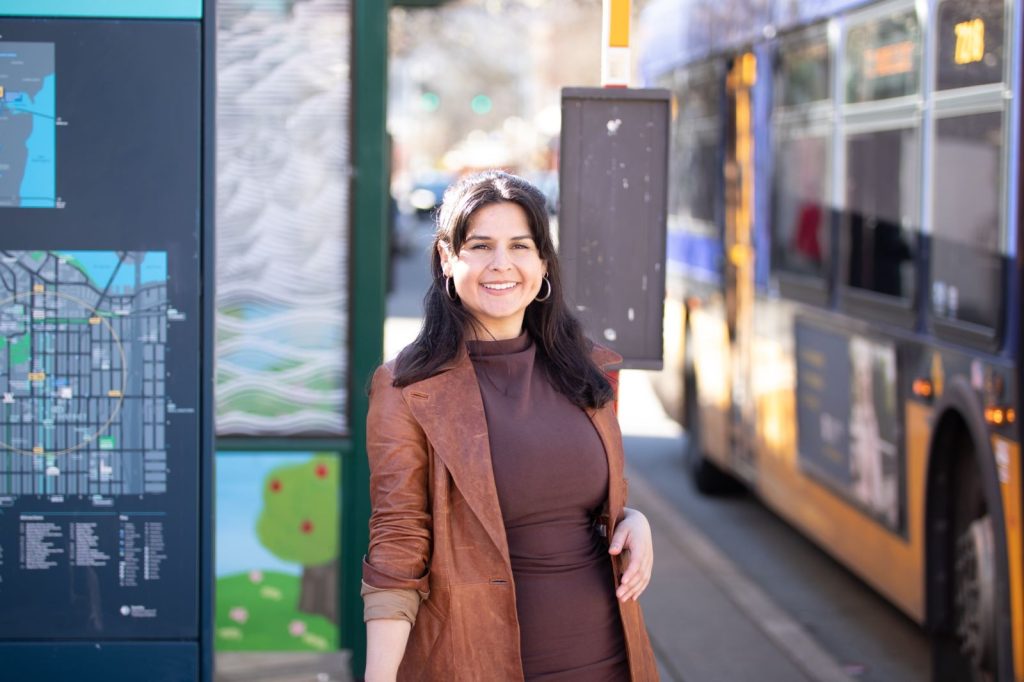
In the primary, we endorsed Alexis Mercedes Rinck, who clearly came to the fore as a credible progressive challenger to challenge conservative-leaning Woo. Voters agreed and backed Rinck in the primary; she gained more than 50% of the vote, compared to just 38% for Woo. This gives Rinck the upper hand as the pair rematch in the general election.
Rinck is uniquely experienced with building effective coalitions across disparate viewpoints and advancing broad solutions to our housing affordability challenges. She also articulated a clear need for and path toward progressive revenue options that adequately fund the city programs and development that Seattle needs. She’s ready to throw her weight behind an ambitious comprehensive plan that actually meets our city’s future housing requirements.
Rinck is prepared to bring pragmatic problem-solving to address Seattle’s looming budget deficit, make the city safe and affordable, and do the work of governing as directed by voters, not corporations. We need her experience, her vision, and her grit. Vote Rinck.
Pierce County Executive – Ryan Mello
Voters in Pierce County have a golden opportunity to take their county leadership in a new direction, after eight years under Republican Bruce Dammeier. County Council Chair Ryan Mello is the perfect fit. During his time on both the county council and the Tacoma City Council, Mello has proven himself to be a dogged policy wonk who is willing to collaborate to get things done, while holding firm to a bold vision for a better South Sound.
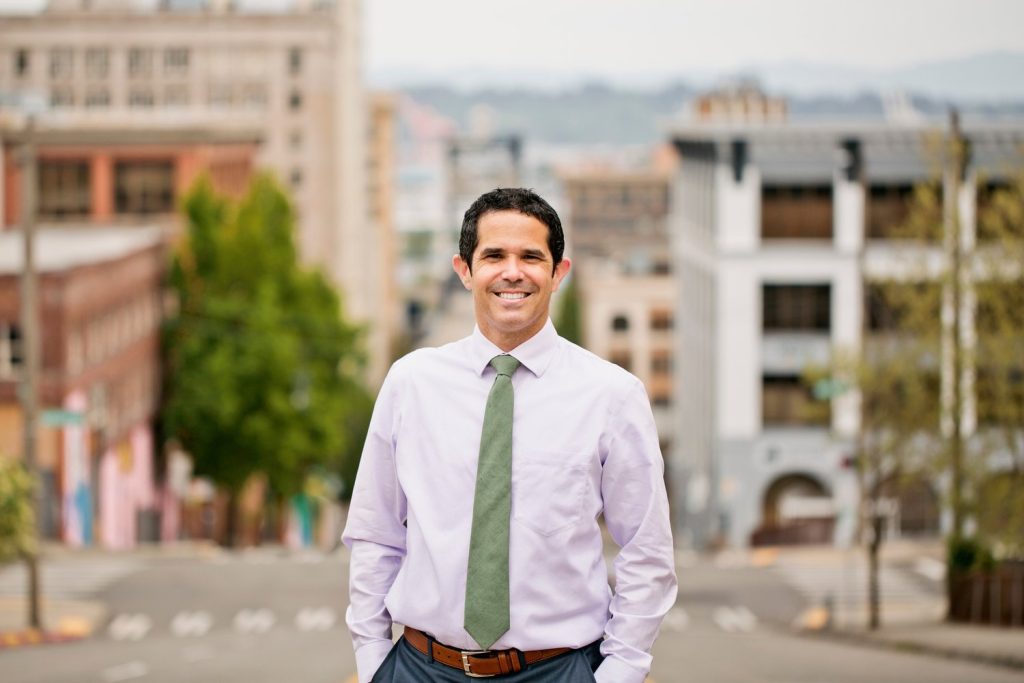
We’re excited that Mello would step in to fill Dammeier’s shoes on the Sound Transit board. In that role, Dammeier has regularly been a bad vote, both in kneecapping transit revenue and undermining the quality of service for riders. He has pushed for the agency to prioritize expensive structured parking over transit trips, argued that Sound Transit should ramp up punitive fare enforcement to bring in more revenue, and voted against a central transit hub in the Chinatown-International District.
Mello, particularly in his role on the Pierce Transit board and at the Puget Sound Regional Council (PSRC), has been a transit champion, arguing against counterproductive regional road expansion projects and fighting to get Pierce County’s first bus rapid transit line completed, despite intense resistance from nearly all nearby levels of government.
Mello has also become a standout advocate for reversing Washington’s traffic safety crisis, an emergency that is felt even more acutely in Pierce County, home to some of the deadliest roads in the entire state, like State Route 7. At PSRC, Mello collaborated with other regional leaders to beef up the Regional Transportation Plan to actually get closer to meeting the moment when it comes to saving lives lost due to the design of our transportation system.
Mello faces Republican Kelly Chambers, who has repeatedly voted against transit, climate action, progressive tax reform, and school funding as a state representative for the 25th District. She’s likely even more conservative than Dammeier.
To say that Mello would be a breath of fresh air for leadership in Pierce County is an understatement. Vote Mello.
Pierce County Council District 2: Davida Haygood
Davida Haygood is passionate about making housing more affordable, empowering young people, and promoting economic justice. With her background as an educator and her active involvement with state legislators, she definitely brings the skills needed to be effective on the Pierce County Council. She’s committed to coming up with a smart plan for growth in unincorporated Pierce County, improving transportation, and approaching homelessness with kindness and effective solutions. Haygood is a big supporter of creating more union jobs and promoting sustainable growth. Davida has a proven ability to build partnerships and make meaningful progress. We are excited about the leadership that Davida Haygood could bring to Pierce County Council.
Haywood won 39% of the primary vote and will face incumbent Republican Paul Herrera, who claimed 53%. A former police sergeant, Herrera is running on tax cuts for the rich, blocking housing for homeless people, climate delay, and more of the same on public safety. He backs the Republican-backed statewide initiatives seeking to claw back progress on school funding, infrastructure, and progressive tax reform. We could do a lot better. Vote Haygood.
Pierce County Council District 3: John Linboe
John Linboe is a standout candidate for Pierce County Commissioner Board District 3, Linboe is focused on empowering labor and economic opportunity, and his forward-thinking vision for transit that supports all Pierce County residents, both rural and urban, resonates with us. His big dream for a rail line that connects Tacoma and all the communities in between with the majesty of Mt. Tahoma made us swoon. Linboe pointed out effective transit systems can liberate rural residents and elders from being beholden to personal vehicles to get around.
With a diverse background in union machinist work, building, farming, and fire commissioning, John brings a wealth of hands-on experience and community leadership. His advocacy for thoughtful regional solutions to homelessness, robust renter protections, and sustainable development closely aligns with the goals of creating a vibrant and equitable Pierce County. We were struck by Linboe’s ability to convey much in few words, succinctly boiling down big issues and making them relatable. Linboe said more in two minutes than we’ve heard more loquacious, silver-tongued politicians say in whole speeches.
Linboe’s progressive populist platform centers on economic justice, comprehensive school funding, and transportation infrastructure underscores his dedication to improving the quality of life for all residents. Pierce County voters should support John Linboe for his visionary leadership and commitment to creating a thriving, inclusive community where everyone can prosper and perhaps someday be able to take the train to a trailhead.
Pierce County’s 3rd is a tough district for Democrats. Linboe won 28.5% in the primary, but incumbent Republican Amy Cruver garnered 59%. While it may be an uphill battle, we appreciate that Linboe is running on real solutions and raising a standard worth rallying around. Vote Linboe.
Pierce County Council, District 6 – Jani Hitchen
Running for a second term on the County Council, Jani Hitchen impressed us with her views on economic justice and supporting students within Pierce County. A former educator who has worked in both the Clover Park and Bethel School Districts, Hitchen has creative ideas for better supporting military families, including addressing food insecurity and learning from youth-created care programs across the country. A supporter of increasing affordable housing, she believes that families should be able to live and thrive in the community they want to call home. Hitchen is an advocate for creating dense housing in accessible and transit-ruch parts of her district, and expressed the need for the County to work with federal partners to alleviate housing pressures on communities by creating more housing on Joint Base Lewis-McChord.
Hitchen will face Republican challenger Loujanna Rohrer, who garnered almost 47% of the primary vote. This could be a close election, so do not sit this one out.
Hitchen is a down-to-earth, pragmatic candidate who is an excellent choice for urbanist voters. Our conversation with her felt both warm and deeply informative, as it is clear Councilmember Hitchen recognizes the needs of her constituents, while also understanding the steps she needs to take to work with a diversely aligned County Council. We enthusiastically endorse Hitchen for Council District 6.
Washington State Legislature

LD1, Position 1: Davina Duerr
Rep. Davina Duerr has been a stalwart vote on housing and climate issues and a real asset in the state house. She holds the distinction of being recognized in The Urbanist’s annual legislative hero roundup four straight years thanks to her tireless work on these issues. Some lawmakers are all talk, little action, but Duerr’s legislative successes show she is, in fact, a doer.
As an architect, she brings a depth of knowledge to housing policy, which has aided in drafting housing bills that are actionable and effective. She supports rent stabilization and a state income tax, seeing it as a way to lower the burden on low-income households and enact progressive tax reform.
With her background advocating with Bothellites for People-Oriented Places (BoPOP), Duerr has been fighting for urbanist causes for a long time — and grappling with how to calibrate those ideas to resonate with a suburban audience. That experience is invaluable in the legislature, where many lawmakers are not always well-versed in urbanism. The legislature is much better with Duerr in it.
LD5, Position 1: Victoria Hunt
With de Leon out, Victoria Hunt steps up as the clear choice for LD5, Position 1. Hunt has already been making it happen; on the Issaquah City Council, she backed bold efforts to increase housing density in Central Issaquah without sacrificing the gorgeous green that defines our region. From pushing rent stabilization and progressive tax reform to championing transit-friendly, affordable housing, Hunt has proven she knows how to get results.
Unfortunately, Hunt’s opponent, Mark Hargrove, seems stuck in the past, proposing to tear down the Growth Management Act (GMA) like it’s some kind of roadblock. Spoiler: It’s not. The GMA is the reason we still have forests, farmland, and a Pacific Northwest worth fighting for. Hargrove’s vision of “freedom” looks a lot like endless subdivisions and traffic-clogged highways. But Hunt knows better: we need to grow up, not out. Her track record shows that we can build more housing, boost affordability, and protect what makes our region special all at the same time.
The future of LD5 isn’t about paving over paradise. It’s about building thriving, connected communities while keeping our green spaces intact. Victoria Hunt is the leader with the vision and experience to make that happen, while the PNW is still green.
LD22, Senate: Jessica Bateman
Electing Jessica Bateman to the state senate is a slam dunk in our book. Before Bateman came around, statewide housing action had long been stalled out, but she united a strong coalition that passed a spate of major housing wins highlighted by her signature statewide missing middle zoning legislation, House Bill 1110. Those wins earned her the distinction as top hero billing in The Urbanist’s 2023 legislative recap.
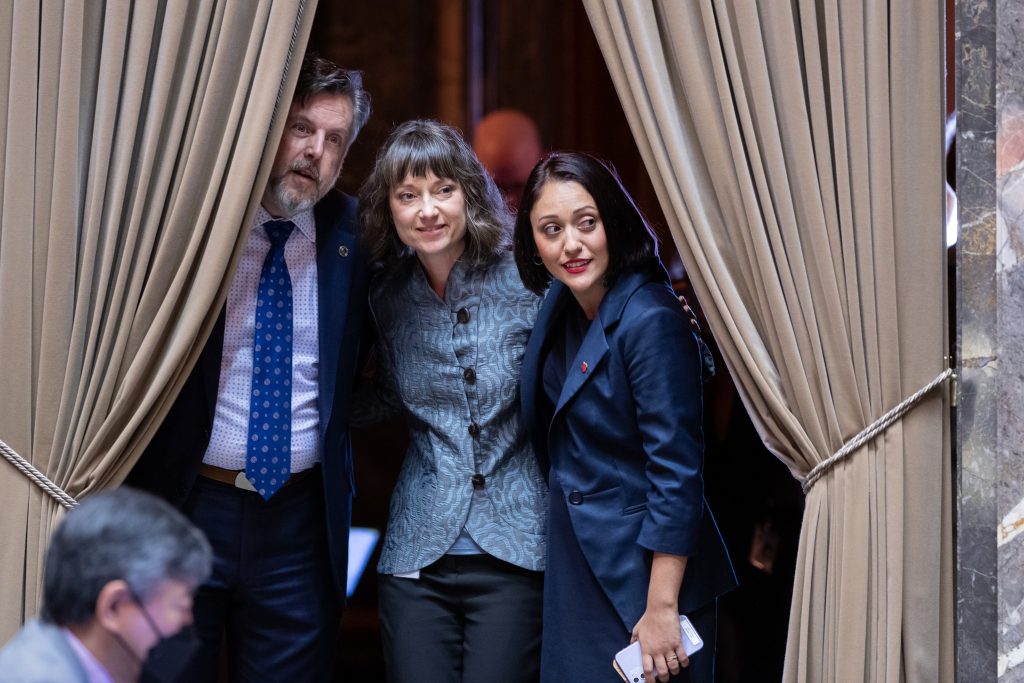
Bateman aims to continue building on her wins by passing the transit-oriented development bill that eluded the legislature the last two sessions. She also has a builders’ remedy bill that could ensure more accountability from local jurisdictions that look for loopholes and race to the bottom to produce the least new housing. She has also been a stalwart vote on progressive tax reform, rent stabilization, labor protections, education funding, and just about every progressive cause that comes her way. Vote Jessica Bateman.
LD27, Senate: Yasmin Trudeau
Sen. Yasmin Trudeau has been a progressive leader and powerhouse of a housing champion and deserves another term. She supported the push to end exclusionary zoning and promote denser sustainable housing in transit-rich areas and has been leading the charge on the rent stabilization bill in the Senate. Trudeau introduced a transit-oriented development bill that mandated the inclusion of affordable housing, and supported the 2023 version without an affordability mandate.
“There are pros and cons to each,” Trudeau told us. “But it is imperative that we proceed with that intention in mind. I am a part of these ongoing policy discussions because we have a lot of development potential around transit but I also need to be sure, based on the experiences of communities like mine, that we are not adding to the displacement of current lower income residents.”
Trudeau has been an advocate for increasing police accountability and advancing upstream solutions to public safety. She noted she has family members who are disabled and some who prefer not to drive, so she understands the need for improving transit and multimodal options at a personal level.
Trudeau faces Republican Carole Braaten, who she trounced in the primary by a wide margin and does not appear to have a website or platform to speak of.
It’s a clear-cut case. Vote Yasmin Trudeau.
LD27, Position 2: Devin Rydel Kelly
Devin Rydel Kelly is a progressive running against incumbent Representative Jake Fey, a career politician and chair of the House Transportation Committee. Fey is a car-centric, middle-of-the-road politician who has pushed highway expansion over wiser, climate-friendly investments. Rydel Kelly seeks to bring a fresh approach, prioritizing middle housing, transit, and community-centered activism. Growing up in Tacoma, Rydel Kelly experienced housing-instability as a child and turned to grassroots activism in college. He supported the Tacoma Tenant Bill of Rights and believes the legislature has an obligation to remove housing barriers by enacting rent stabilization and creating a department of housing at the state level.
Fey claimed first place in the primary, suggesting it will be a tough race to defeat the 12-year incumbent. Nonetheless, Rydel Kelly has much to offer Tacoma urbanists and progressives. He is strongly aligned with progressive tax reform to fix our upside-down regressive tax structure. Rydel Kelly believes we need a state-income tax and is actively campaigning against rollbacks to the capital gains and climate tax provisions. He has diverse ideas for transit alternatives, including bus rapid transit and rail. We are excited about the fresh perspective Rydel Kelly brings to this race, and hope he can help advocate in Olympia on behalf of Tacoma’s urbanist voters.
- Devin Rydel Kelly Questionnaire
- Jake Fey did not return a questionnaire.
LD28, Senate: T’wina Nobles
Senator T’wina Nobles is up for re-election and deserves a second term. Nobles quickly became a legend after unseating Republican Steve O’Ban in 2020, and solidifying Democratic majorities in the Washington State Senate, clearing the way for major wins like the Climate Commitment Act, the capital gains tax, and greater investment in affordable housing. Nobles’ extensive background as a community leader, educator, University Place School Board director, head of the Tacoma Urban League and co-founder of the Black Future Co-op Fund, demonstrates her deep commitment to inclusivity and economic justice. Her advocacy for educational equity, support for small businesses, and personal experiences deeply inform her policy perspectives and dedication to community service.
As a renter herself, Nobles understands the need for removing barriers to homeownership as well as creating protections for renters. She has co-sponsored urbanist legislation including rent-stabilization and even-year election bills and continues to advocate for progressive tax reforms in our state. In Senator T’wina Nobles, we see a leader who envisions a better future with vibrant, equitable communities and actively works towards making it a reality for all Washingtonians. Vote Nobles.
LD29, Position 1: No Endorsement
Unfortunately, in the 29th District’s Position 1 race, both candidates we interviewed fell flat. Richard Miller is running as a Democrat and community advocate. He holds the endorsements of some heavy hitters in Pierce County including the Franklin-Pierce School Board President, as well as members of the Tacoma City Council and the Pierce County Young Democrats. However, his responses to our questionnaire were lackluster at best. We worry that Miller does not have more than a surface level understanding of most urbanist issues, let alone any issue for that matter. Miller’s credentials don’t stand up against the incumbent in the race, Representative Melanie Morgan.
However, we found our interview with Morgan to be even more concerning. She was first elected in 2018, defeating a serial harasser in the height of the Me Too Movement. While she brings a lot of perspective to the table, sharing her experience with homelessness and being a military veteran, it was abundantly clear that Morgan has yet to understand the dangers of holding the kind of power one gets as an elected official. Morgan has come under fire for two separate ethics investigations regarding her mistreatment of legislative staff since taking office. These complaints concern us, and they have cost her access to staff at the State Capitol.
When we asked for Morgan’s response to these mistreatment claims, she used the time to skirt accountability, blaming the hiring process of staff and the inability for new employees to get the hang of working the legislative session. We agree with Morgan that due to structural racism, systems in place often villainize women of color like Morgan. But this does not mean anyone – including Morgan – is above the responsibility of respecting her staff, the backbone of legislation in Olympia, and responding to allegations thoughtfully rather than lashing out defensively.
As the interview wore on, we grew concerned about Morgan’s policy platform. Throwing a staffer who filled out her questionnaire under the bus, she clarified in her interview that she does not support a state income tax, despite backing it in our questionnaire. She claimed a state income tax would make the state tax code (already ranked one of the most regressive in the nation) even more regressive, which doesn’t add up for us. The wealthy clearly pay more under an income tax, particularly a progressive one.
Morgan also expressed opposition to approving even-year elections. Her reasoning again fell back on (dare we say) selfish reasons, as even-year elections would not allow her to run for school board again, a position she would like to hold in tandem with her title as state legislator. Morgan claimed this change would be viewed as a “conspiracy” by Black voters in her district. We wish we had a better answer for the 29th district, but unfortunately, we don’t.
LD29, Position 2: Sharlett Mena
Rep. Sharlett Mena has had an impressive first term. As Vice-Chair of the Environment & Energy Committee, many of her wins focus on environmental justice, including banning dangerous chemicals from personal care products, aiming to prevent microplastics from getting into our water, and protecting communities from utility cutoffs during extreme heat events. Mena came to the legislature as a voting rights advocate and has continued to fight for fair elections and equitable representation. Further, her top priorities for her next term are rent stabilization and transit-oriented development – and we could not agree more. The legislature is a better place with her in it. Vote for Mena.
LD33, Position 2: Mia Su-Ling Gregerson
Rep. Mia Gregerson told us she’s all for building the bridges connecting local and legislative government so that we can start really addressing “housing affordability, wealth building, and efficient use of tax dollars” with a multifaceted approach, and we are all in. She has been a leader on housing and homelessness, and we also appreciated her introducing even year elections reform in the last few sessions. She’s unabashedly for implementing a state income tax and other forms of progressive tax reform. On transit she recommends that we should be spending more of our transportation budget on alternatives to cars. She is critical of criminalizing poverty, supports rent stabilization, backs reducing transit fares, and overall she’s been a great progressive voice. Vote Mia Gregerson.
LD34, Position 1: Emily Alvarado
During her first two sessions in the legislature, Rep. Alvarado has punched well above her class as a first-term legislator. She took the lead in the House on a bill that would finally repeal Washington’s antediluvian “jaywalking” laws, introduced numerous bills dealing with the minutiae of affordable housing production, and spearheaded the chamber’s ambitious rent stabilization and tenant’s rights bill, HB 2114, that ultimately died in the State Senate. With significant turnover coming to the Senate next year, we’re hopeful that Alvarado will be right back at it next year, fighting for tenants and affordable housing. Vote Alvarado.
LD34, Position 2: Joe Fitzgibbon
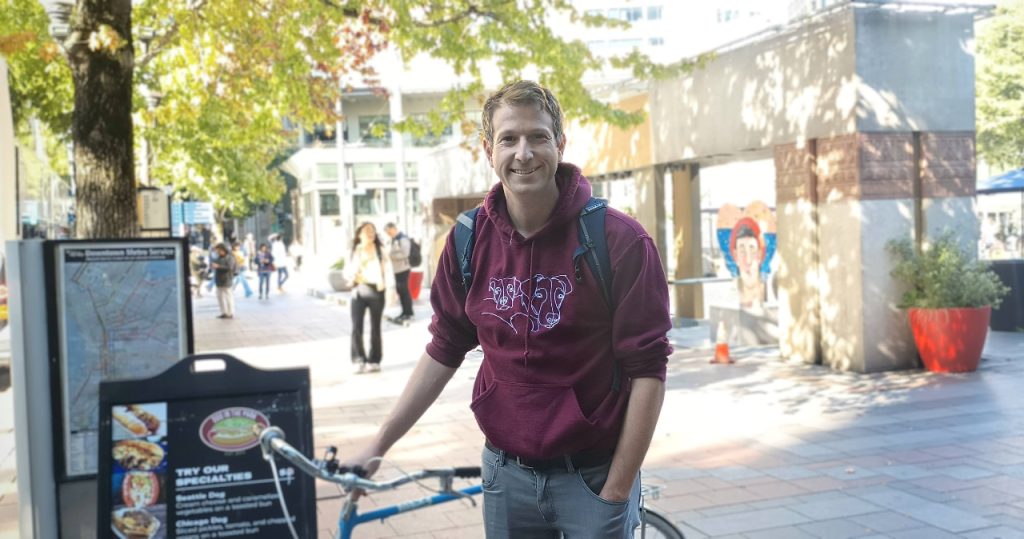
House Majority leader Joe Fitzgibbon continues to be a reliable leader on climate, housing affordability, and transportation – all of the core urbanist policy issues. His only challenger is a Republican Precinct Committee Officer who really loves fracked gas. In contrast, Fitzgibbon was a key negotiator in major climate legislation that holds big polluters accountable to the costs they offload onto society and future generations. Endorsing Fitzgibbon is an easy call and we hope that if voters give him another term, we’ll see the realization of his hope that rent stabilization (he was a co-sponsor of HB2114 in 2023) could come to pass in the next session.
LD36, Position 1: Julia Reed
Representative Julia Reed is an e-bike commuter and verified urbanista who has quickly hit her stride in her first term. She was unafraid to call out the lack of Democratic support that caused the failure of the missing middle housing bill before she arrived in the House. Pressure against holdouts finally breached the dam holding back statewide zoning reform in 2023. Since taking office, she has kept up that energy as one of the most active and forthright legislators, who is not afraid to reveal what is happening to stall bills and why. Reed keeps a close eye on policy implementation, and she has criticized Seattle Mayor Bruce Harrell’s bare minimum approach to the missing middle reform she helped pass and attended a rally pushing the City of Seattle to go further to expand housing opportunities.
As lead sponsor, Reed shepherded a transit-oriented development bill, and aims to get the bill over the top in her next term. She knows that the key to safe communities is uplifting those in need through housing, social services, and care. When asked about her priorities next session, she said “rent stabilization and passing the transit-oriented development bill. But I also want to work on increased accountability for implementation of housing reform laws, speed up permit times, manage local fees, and eventually establish a Department of Housing for the state.” We’re thrilled to keep working with her on these priorities next session. Vote Julia Reed!
LD36, Position 2: Liz Berry
Two-term Representative Liz Berry is a powerhouse who has done a fabulous job representing the 36th District by introducing major progressive legislation. Berry has backed the progressive tax reform efforts led by Senator Noel Frame, signing on to legislation for wealth tax and guaranteed basic income. She has passed critical protections for ride hailing drivers. Plus, she serves on the transportation committee and helped broker multimodal improvements to the Move Ahead Washington that included $50 million to improve safety on crash-prone Aurora Avenue in North Seattle.
We are delighted to support her for re-election this year and as Chair of the House Labor Committee we love that her strong labor credentials will continue to build bridges between the urbanist and labor movements that are beneficial to both. She also has an opponent who did not fill out our questionnaire this year, but last year was diametrically opposed to our values. Her opponent is a Republican with no coherent policy platform. Vote Liz Berry!
LD37, Position 2: Chipalo Street
We admit: when we first met Rep. Chipalo Street in our endorsement interviews during his first run in 2022 and found out he was a landlord? We were sus. But in the last two years, Street has proven to be a dogged champion of ambitious renter protections like essential rent stabilization policy and has shown no signs of relenting. In his first term, he brought a sharpened understanding of creative ways in which to boost housing production, and he has used that expertise to deliver. We’re also fans of his enthusiasm to make the state’s real estate excise tax more progressive to establish a stronger recurring stream of revenue to build affordable housing. Overall, this one’s an easy choice. We look forward to Street’s second term.
LD38, Position 1: Julio Cortes
Incumbent Julio Cortes has shown real enthusiasm for the work of legislating. Cortes’s support for progressive revenue sources and co-sponsorship of rent stabilization bill HB 2114 are just a few of the highlights from his policy priorities. He’s served one term and we’re eager to see what he can do with a second.
His primary opponent, Annie Fitzgerald, also impressed us with her support for progressive priorities like increased transit funding, Universal Health Care, and Universal Guaranteed Income. Fitzgerald, a disability rights activist and a person with disabilities, also emphasized the importance of accessibility in transit and housing, bringing a necessary and too often overlooked perspective to these issues. We could also see how Fitzgerald has to work even harder in our current campaign system to reach voters with her message. We hope that her candidacy raises awareness about the inaccessibility of our current system and leads to real change that will allow more candidates with disabilities to participate.
Ultimately, while both Cortes and Fitzgerald bring strong progressive values, Cortez has the experience of legislating and we think he’s earned another term.
LD41, Position 2: My-Linh Thai
Incumbent My-Linh Thai continues to impress us and deserves another term in Olympia. She shared bold plans to work on progressive tax reform, reduce corporate loopholes, and pursue a wealth tax. As a Vietnamese refugee, Thai has been an outspoken advocate for immigrant rights and investments in working families. She supports rent stabilization and a transit-oriented development bill with an affordability mandate. She has shown a penchant to take a stand and fight for what’s right. Vote Thai.
LD43, Position 1: Nicole Macri
The Urbanist loves Nicole Macri because she’s as laser-focused on the issue of housing as we are. One of the most stalwart members of the House caucus on the issue of renter protections, Macri went to the mat on a rental stabilization bill this year, even as it was blocked by conservative Democrats in the State Senate. She’s also a big supply hawk, standing strong behind bills to force local governments to allow more housing within their borders. As vice-chair of the House Appropriations committee, she’s fought for essential funding to combat homelessness. Fewer lawmakers understand the direct link between housing and homelessness like Rep. Macri and the legislature is better with her in it.
LD43, Position 2: Shaun Scott
Regular readers of the Urbanist are likely familiar with Shaun Scott, an anti-poverty policy advocate, historian, former city council candidate, and occasional Urbanist contributor. Scott is running for the open seat (the incumbent, longtime Representative Frank Chopp, is retiring) with a progressive policy platform, focused largely on economic and climate justice. Scott is in alignment with The Urbanist on the issues most important to us – he is supportive of efforts to advance affordable housing and invest in mass transit. Scott’s plans are detailed and thoughtful, and while his vision is ambitious, it is clear that he is familiar with the practical work of getting things done. Voters seemed to recognize this, as Scott won 53% of the primary vote in a three-way race.

Running against Scott is Andrea Suarez. Suarez is the founder and executive director of We Heart Seattle, the controversial volunteer trash “clean up” group that has been accused of throwing away the belongings of unhoused people and engaging in abusive behaviors. Suarez, for her part, denies these accusations. Suarez clearly recognizes that housing affordability and homelessness are critical issues in our community, but does not offer meaningful structural solutions. Suarez’s statements about people experiencing homelessness – such as this interview provided to Seattle Police Officers Guild President Mike Solan, in which Suarez suggests that some people living in permanent supportive housing should not be allowed to leave their apartments – suggest that her primary interest is in sweeping the problem under the rug, rather than building a world where poverty and homelessness do not exist. We believe this is wrong, both morally and tactically. We cannot disappear our problems by disappearing people.
There’s also the issue that Suarez is a Republican pretending to be a Democrat despite a clear and recent record of campaigning with Republicans and endorsing Republican stances. The King County Democrats have denied her access to party resources because they don’t see her as aligned and trustworthy.
Our choice in this race is clear: we are endorsing the only candidate in the race who is aligned with Democratic values, let alone urbanist values, and the only candidate in the race with the policy chops to make meaningful accomplishments in Olympia. Vote Scott.
LD45, Position 2: Melissa Demyan
Often, candidates who describe the origins of their campaigns against long-time incumbents as a reaction to a specific vote or issue present more as protest campaigns than serious challengers. Not Melissa Demyan. Though she cited incumbent Larry Springer’s vote against unemployment benefits for striking workers as the impetus for her campaign, Demyan is anything but a protest candidate. An experienced organizer and campaign manager, Demyan led with her labor credentials and detailed policy knowledge, impressing us with her thoughtful approach to the complexity of affordability mandates in pending transit-oriented development legislation, unequivocal opposition to the criminalization of homelessness, and clear-eyed strategy for victory in November.
Springer, a 20-year incumbent and the current Deputy Majority Leader, was mealy-mouthed about criminalizing sleeping outside and he did not vote in support of the Keep Our Cares Act, which would ensure hospital mergers and acquisitions don’t restrict patients’ access to critical health care. Holdouts like Springers stalled the bill even after it cleared the senate. Though Springer had solid answers to our questionnaire and the experience of his many years in the role, we’re ready to see what a new voice can do in LD 45. Vote Demyan.
*Hannah Sabio-Howell recused
LD46, Position 2: Darya Farivar
Rep. Darya Farivar, who we endorsed in 2022, is seeking reelection. We have no complaints, which is rare for us. In her first term, Rep. Farivar has supported affordable housing, and sponsored bills for even-year elections and allowing certain misdemeanors to be resolved with mental health treatment instead of jail time. She has also been unafraid to stand up for her values, even when she stands alone – in 2023, she was the only representative to vote against loosening restrictions on dangerous police car chases. We look forward to seeing what she does in her second term. Farivar has earned your vote.
Other Returned Questionnaires
- Lisa Callan, LD5, Position 2 (incumbent)
- Gerry Pollet, LD46, Position 1 (incumbent)
- Amy Walen, LD48, Position 2 (incumbent)
The Urbanist Elections Committee consists of Angela Compton, Kacie Masten, Ryan Packer, Maya Ramakrishnan, Hannah Sabio-Howell, Jazmine Smith, Doug Trumm, Kelsey Vanhee, and Anita Yandle.


Elections Committee
The Urbanist was founded in 2014 to examine and influence urban policies. We believe cities provide unique opportunities for addressing many of the most challenging social, environmental, and economic problems. We serve as a resource for promoting urbanism, increasing political participation, and improving the places we live. The Elections Committee consists of community volunteers and staff members of The Urbanist and is a standing body representing the political values of our organization.

